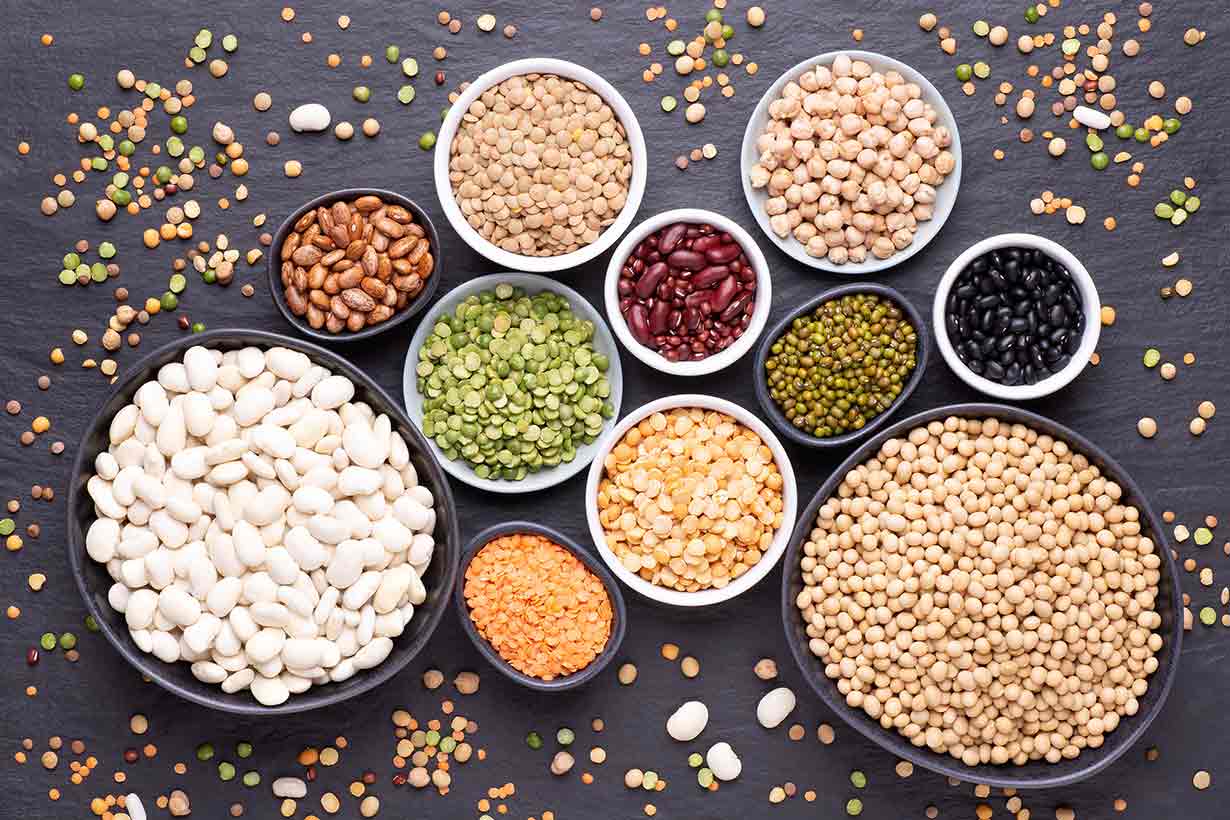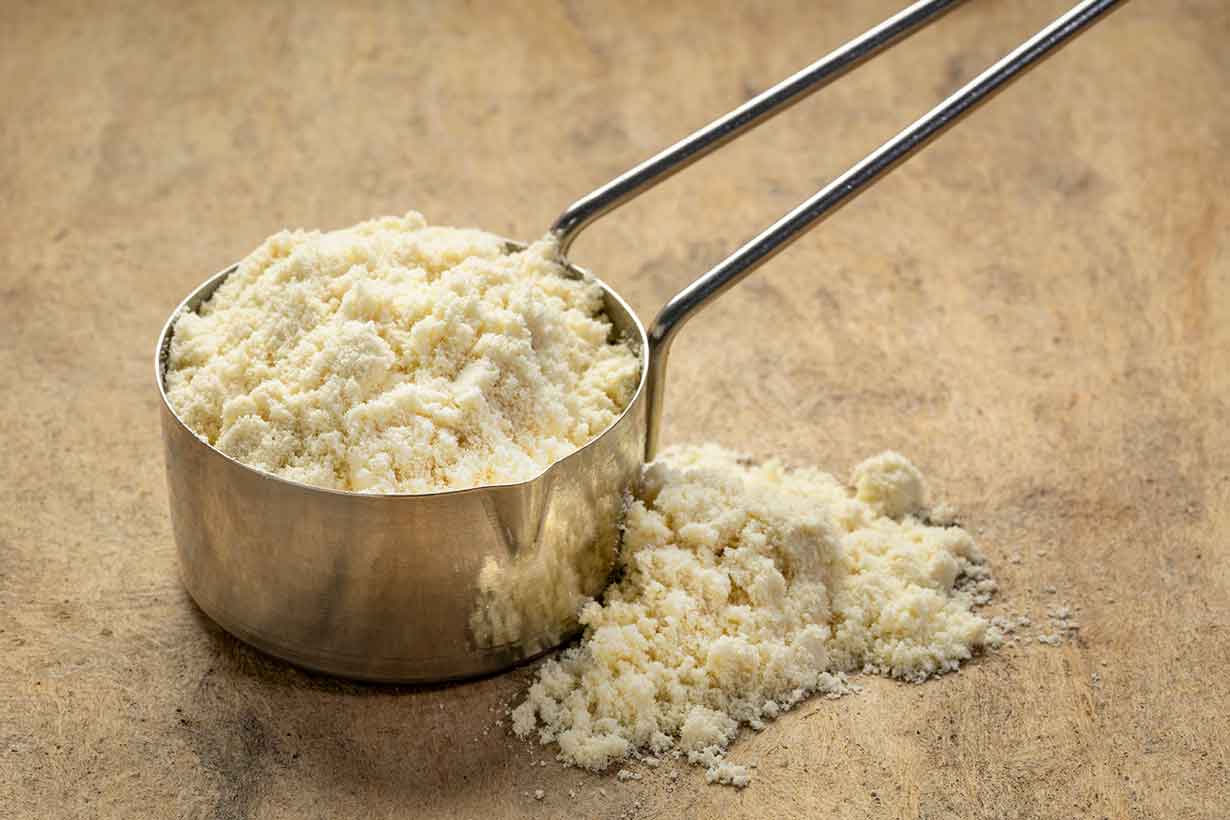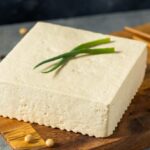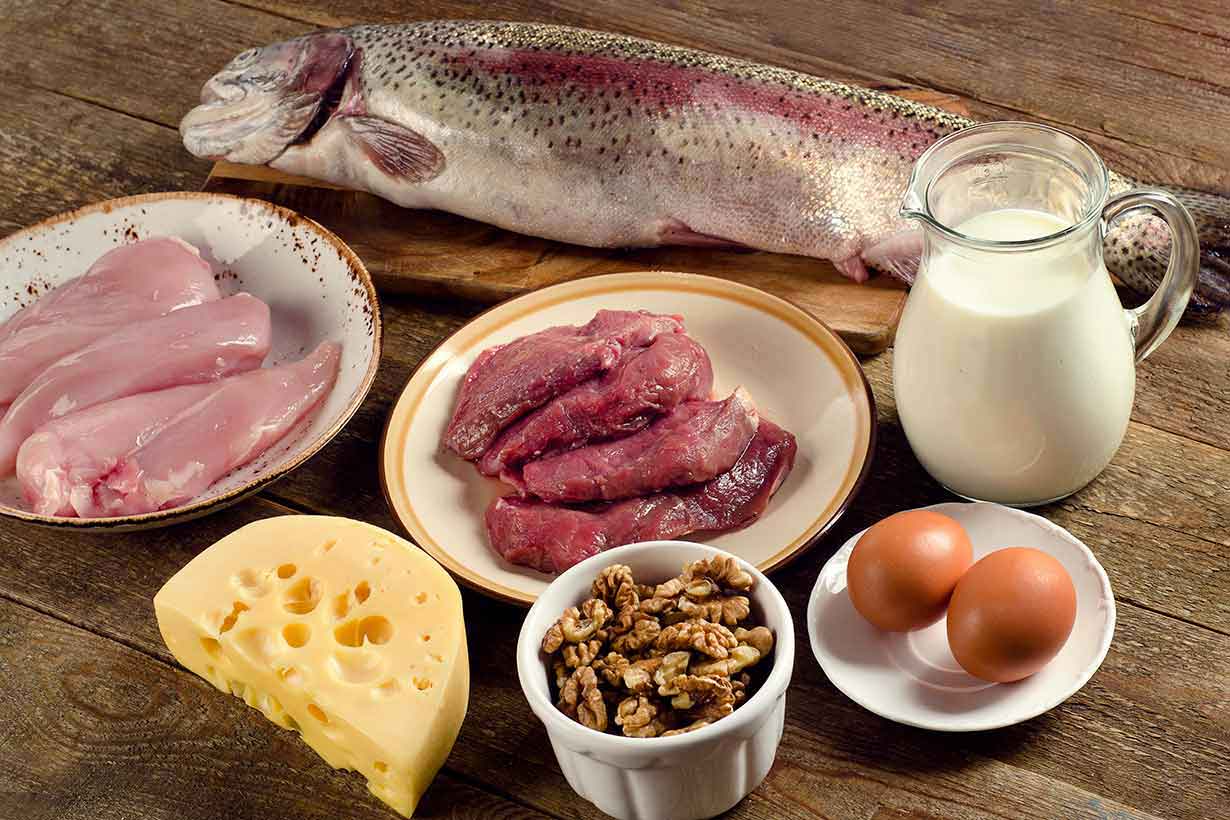Disclosure: This post may contain affiliate links. This means if you click on one of these links and purchase an item, we will receive a small commission at no extra cost to you. All opinions are our own.
In recent years, protein powder supplements, known for being rich in protein and low in calories, have witnessed a surge in popularity. Among these, soy protein is one of the most popular choices.
This article will explore the nutritional properties of soy protein, examine its effectiveness, and determine whether it is a good choice as a protein supplement.
Additionally, it will assess how soy protein compares to another popular protein powder called whey protein.
Table of contents
- What Is Soy Protein Powder?
- Nutritional Properties of Soy Protein Powder
- General Benefits and Downsides of Soy Protein
- Does Soy Protein Help You Build Muscle?
- Does Soy Protein Have Any Other Health Effects?
- Does Soy Protein Influence Hormone Levels?
- Soy Protein vs. Whey Protein: a Comprehensive Nutritional Comparison
- How To Use Soy Protein Powder
- Final Thoughts: It Soy Protein Supplementation a Good Choice?
What Is Soy Protein Powder?
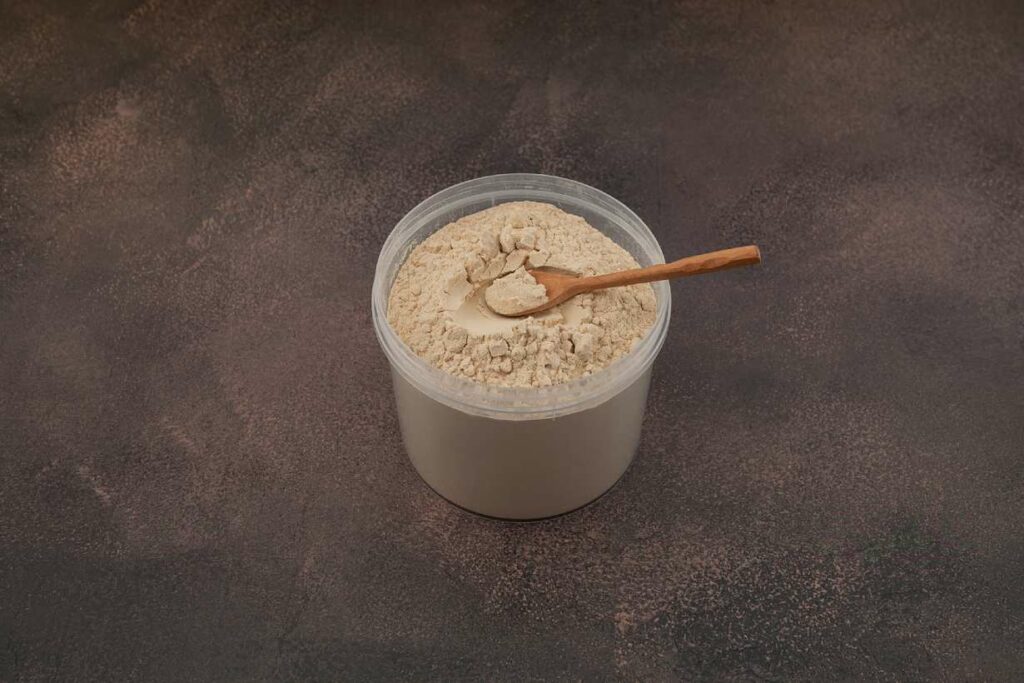
To begin, soy protein is a powder manufactured from pure soybeans, a type of legume.
However, the extraction of concentrated protein from soybeans requires several steps.
In this context, here is an overview of soy protein powder’s production process (1):
- Washing: The first step involves washing and cleaning harvested soybeans, typically after dehulling them.
- Defatting: After this, the fat content (soybean oil) is extracted from the soybeans for commercial production. Following the defatting process, soybean meal remains. This soybean meal has a high protein content, yet also contains a relatively high amount of carbohydrate.
- Protein separation: Moving forward, the soybean meal undergoes a process that separates the protein from the carbohydrates. The process typically used is called isoelectric precipitation (2).
- A second washing: After separating the protein, a second wash helps to remove any residual carbohydrates still present.
- Drying: Once the protein is fully separated from the carbohydrate, the mixture goes through a drying process, which results in a high-protein soy powder. This is sold commercially as ‘soy protein concentrate.’
Common Commercial Uses
Like whey protein, soy protein powder is a versatile ingredient.
The following commercial products often incorporate soy protein powder:
- Protein powder supplements
- Pre-made, ready-to-drink protein shakes
- Protein bars
- Snack foods
- Meat alternatives
- Sauces
- Infant formula
- Breakfast cereals (especially ‘high protein’ cereals)
- Bakery products
- Soy milk
- Soy-based dairy alternatives (e.g. vegan yogurt and cheese)
Soy protein powder is often popular with vegan gym goers due to its plant-based nature and high protein content.
Types of Soy Protein
There are two main types of soy protein (3):
- Soy protein concentrate: Soy protein concentrate typically has a protein content of 60-70% by weight.
- Soy protein isolate: Soy protein isolate undergoes a more extensive protein separation processes to achieve the highest protein content possible. It is typically around 90% protein by weight.
Nutritional Properties of Soy Protein Powder
Next, let’s delve into the nutritional values of soy protein.
In the upcoming sections, you will find the basic nutritional properties, vitamin and mineral content, and amino acid composition of soy protein concentrate.
The source of nutritional data is the USDA’s FoodData Central database (4).
Daily values have been calculated using this USDA data alongside the FDA’s recommended daily values, which are based on a 2000-calorie diet (5).
Nutritional values are presented per ounce (28.35g) serving of soy protein concentrate.
| Name | Amount | % Daily Value |
|---|---|---|
| Calories | 93 kcal | |
| Carbohydrates | 7.2 g | 2.6% |
| Fiber | 1.56 g | 5.6% |
| Sugars | 5.67 g | |
| Fat | 0.13 g | 0.2% |
| Saturated | 0.015 g | 0.1% |
| Monounsaturated | 0.022 g | |
| Polyunsaturated | 0.057 g | |
| Omega-3 | 0.007 g | |
| Omega-6 | 0.05 g | |
| Protein | 18.0 g | 36% |
| Cholesterol | 0 mg | 0% |
As the table shows, soy protein concentrate boasts a high protein content, with around 18 grams per ounce serving. It also contains a modest quantity of carbohydrate and minimal fat.
It is also one of the best lower-calorie protein options.
Vitamins
| Vitamin | Amount | % Daily Value |
|---|---|---|
| Folate, DFE | 96.4 mcg | 24.1% |
| Vitamin A, RAE | 0 mcg | 0% |
| Vitamin B1 (thiamin) | 0.09 mg | 7.5% |
| Vitamin B2 (riboflavin) | 0.04 mg | 3.1% |
| Vitamin B3 (niacin) | 0.203 mg | 1.3% |
| Vitamin B5 (pantothenic acid) | 0.016 mg | 0.3% |
| Vitamin B6 | 0.038 mg | 2.2% |
| Vitamin B12 | 0 mcg | 0% |
| Vitamin C | 0 mg | 0% |
| Vitamin D | 0 mcg | 0% |
| Vitamin E | – | – |
| Vitamin K | 0 mcg | 0% |
Soy protein concentrate is not just protein, and it also provides a good amount of the vitamins folate and thiamin.
Minerals
| Mineral | Amount | % Daily Value |
|---|---|---|
| Calcium | 103 mg | 7.9% |
| Copper | 0.277 mg | 30.8% |
| Iron | 3.06 mg | 17.0% |
| Magnesium | 39.7 mg | 9.5% |
| Manganese | 1.19 mg | 51.7% |
| Phosphorus | 238 mg | 19.0% |
| Potassium | 128 mg | 2.7% |
| Selenium | 0.227 mcg | 0.4% |
| Sodium | 255 mg | 11.1% |
| Zinc | 1.25 mg | 11.3% |
Soy protein concentrate is an excellent source of various minerals. Among these, it is particularly high in copper, manganese, and phosphorus.
Amino Acid Profile
| Amino Acid | Amount |
|---|---|
| Alanine | 0.76 g |
| Arginine | 1.32 g |
| Aspartic acid | 2.06 g |
| Cystine | 0.251 g |
| Glutamic acid | 3.4 g |
| Glycine | 0.76 g |
| Histidine | 0.448 g |
| Isoleucine | 0.833 g |
| Leucine | 1.4 g |
| Lysine | 1.11 g |
| Methionine | 0.231 g |
| Phenylalanine | 0.93 g |
| Proline | 0.936 g |
| Serine | 0.955 g |
| Threonine | 0.7 g |
| Tryptophan | 0.237 g |
| Tyrosine | 0.652 g |
| Valine | 0.868 g |
Soy protein contains a good amino acid, providing all nine essential amino acids. These include histidine, isoleucine, leucine, lysine, methionine, phenylalanine, threonine, tryptophan, and valine (6).
However, it is relatively low in methionine. However, providing the overall diet contains other sources of this amino acid, this should not be a cause for concern.
Rich sources of methionine include animal-based protein sources and grains.
General Benefits and Downsides of Soy Protein
Before delving into recent scientific research on soy protein, let’s first summarize its general benefits and downsides.
Benefits
- High protein: Soy protein has a high protein content, with a single ounce-serving providing nearly 20 grams of protein.
- Micronutrients: In addition to its protein content, soy protein concentrate contains a relatively high level of vitamins and minerals. Per ounce serving, it delivers more than 10% of the recommended daily value for folate, copper, iron, manganese, phosphorus, sodium, and zinc. Additionally, it includes over 5% of the daily value for thiamin, calcium, and magnesium.
- Affordability: Soy protein concentrate supplements are generally quite low in price, making them one of the more budget-friendly protein-rich options. Generally, soy protein supplements are priced lower than whey-based protein powders.
- Convenience: Protein shakes made with soy protein are convenient and portable. They take only 30 seconds to make and can be taken to the gym for post-workout consumption.
Downsides
- Comparative protein content: Gram for gram, soy protein concentrate supplements typically have slightly less protein than whey protein concentrate (4, 7). However, the difference is minimal, and for most individuals, this may not be a concern. Opting for a soy protein isolate supplement would provide higher protein content than either soy or whey concentrate.
- Allergy: Soy is one of the nine major allergens alongside milk, eggs, fish, crustacean shellfish, tree nuts, peanuts, wheat, and sesame (8). Consequently, soy protein is unsuitable for the small proportion of the population with a soy allergy.
- Taste: Soy protein is not quite as mild and creamy as protein supplement options like whey protein. It has a slightly stronger, coarser, and somewhat nutty flavor. Nonetheless, many people still enjoy soy protein supplements. Furthermore, for those who don’t find the taste appealing, supplements are available in a wide range of flavored and sweetened varieties.
Does Soy Protein Help You Build Muscle?
Claims circulate on the Internet and social media suggesting that soy protein (and other plant-based proteins) may not be as effective as animal-based proteins.
While animal-based proteins are typically more anabolic gram for gram, the crucial factor lies in achieving an adequate total protein intake to meet goals. A recent study in this domain found that when protein intake exceeds 1.6 grams per kilogram of body weight per day, there is little difference in effectiveness between animal-based and plant-based proteins (9).
Studies On Soy Protein’s Effectiveness and How It Compares To Whey
Now, let’s look at some studies involving human participants that investigated the effectiveness of soy protein.
These studies encompass research examining the effects of soy protein on muscle building, recovery, as well as studies comparing its effectiveness to whey.
Reza Zare et al. (2023).
- Study: Effect of soy protein supplementation on muscle adaptations, metabolic and antioxidant status, hormonal response, and exercise performance of active individuals and athletes: a systematic review of randomized controlled trials.
- Summary: This systematic review analyzed 19 randomized controlled trials on soy protein supplementation, revealing improvements in exercise performance, including enhanced high-intensity performance, delayed fatigue, and improved isometric muscle strength. Additionally, studies comparing soy to whey protein indicated similar increases in lean mass.
- Available from: https://pubmed.ncbi.nlm.nih.gov/37603200/
Masoome Piri Damaghi et al. (2022).
- Study: Comparison of the effect of soya protein and whey protein on body composition: a meta-analysis of randomised clinical trials.
- Summary: This meta-analysis of ten randomized clinical trials assessed the effect of soy and whey protein on body composition. While whey supplementation showed a significant increase in lean body mass, no significant changes were observed with soy protein. Note: This was not a systematic review and did not include several recently published randomized controlled trials.
- Available from: https://pubmed.ncbi.nlm.nih.gov/33971994/
Chunlei Li et al. (2021)
- Study: Daily supplementation with whey, soy, or whey-soy blended protein for 6 months maintained lean muscle mass and physical performance in older adults with low lean mass.
- Summary: In this randomized controlled trial involving Chinese older adults, daily supplementation with whey, soy, or a whey-soy blend for six months helped maintain lean muscle mass and physical performance, with no significant differences between soy and whey supplementation.
- Available from: https://pubmed.ncbi.nlm.nih.gov/33612439/
Savvas Kritikos et al. (2021).
- Study: Effect of whey vs. soy protein supplementation on recovery kinetics following speed endurance training in competitive male soccer players: a randomized controlled trial.
- Summary: Increasing daily protein intake to 1.5 grams per kilogram of body weight through whey or soy supplements mitigated performance deterioration during speed-endurance training. Both whey and soy protein were equally effective.
- Available from: https://pubmed.ncbi.nlm.nih.gov/33726784/
Heidi M Lynch et al. (2020).
- Study: No significant differences in muscle growth and strength development when consuming soy and whey protein supplements matched for leucine following a 12-week resistance training program in men and women: a randomized trial.
- Summary: In this randomized controlled trial, leucine-matched whey and soy protein supplements were compared over 12 weeks of resistance training. Both groups saw increased lean body mass with no significant differences between whey and soy.
- Available from: https://pubmed.ncbi.nlm.nih.gov/32486007/
Mark Messina et al. (2018)
- Study: No difference between the effects of supplementing with soy protein versus animal protein on gains in muscle mass and strength in response to resistance exercise.
- Summary: A meta-analysis of nine studies involving 266 participants found no significant difference between soy and animal protein supplementation in terms of gains in muscle mass and strength in response to resistance training.
- Available from: https://pubmed.ncbi.nlm.nih.gov/29722584/
Shweta Shenoy, Mrinal Dhawan, Jaspal Singh Sandu (2016).
- Study: Four weeks of supplementation with isolated soy protein attenuates exercise-induced muscle damage and enhances muscle recovery in well trained athletes: a randomized trial.
- Summary: A four-week randomized controlled trial on soy protein supplementation in forty young adults showed a reduction in symptoms of exercise-induced muscle damage compared to the placebo group.
- Available from: https://pubmed.ncbi.nlm.nih.gov/27826398/
Does Soy Protein Have Any Other Health Effects?
Here is a summary of research examining the effect of soy protein supplementation on various health markers.
Kidney Disease
A meta-analysis of randomized controlled trials suggests that soy protein intake may be protective against elevated serum creatinine and blood phosphorus levels.
High levels of blood creatinine and phosphorus may indicate that the kidneys are not working properly (10).
Heart Health
A meta-analysis of 43 randomized controlled trials found that a median 30 grams of soy protein per day was associated with an improvement in risk factors for coronary heart disease.
Among these factors, soy protein was associated with decreased LDL cholesterol, slightly higher HDL cholesterol, and lower fasting triglyceride levels (11).
Type 2 Diabetes
A randomized controlled trial involving 41 adults with type 2 diabetes and nephropathy (diabetic kidney disease) compared the effects of two diets.
The first diet was 35% animal proteins, 35% soy protein, and 30% vegetable proteins. The second was 70% animal proteins and 30% vegetable proteins, with no soy protein.
Over four years, compared to the no-soy diet, the diet including soy protein led to significantly decreased CRP levels (C-reactive protein – a marker of inflammation), lower LDL cholesterol, and lower triglyceride levels.
In essence, soy protein appeared to improve cardiovascular risk factors in individuals with type 2 diabetes and nephropathy (12).
Inflammation
A systematic review and meta-analysis of thirty-one randomized controlled trials investigated the effects of whey and soy protein on low-grade inflammation.
While whey protein reduced circulating IL-6 (interleukin-6 – a marker of inflammation), soy protein supplementation led to a significant reduction in TNF-a (tumor necrosis factor-a) levels, another inflammatory marker (13).
Thus, soy (and whey) protein supplementation may potentially offer benefits in reducing inflammation.
Does Soy Protein Influence Hormone Levels?
Concerns are sometimes raised about the possibility of isoflavones in soy having an impact on male hormone levels.
This theory is because isoflavones are phytoestrogens, and have a similar structure to the female hormone, estrogen (14).
However, a comprehensive meta-analysis of clinical studies published in 2021 looked into this topic.
This meta-analysis included 38 clinical studies that tested testosterone and estrogen levels in men consuming soy foods, soy protein, or isoflavones.
The analysis found that regardless of the dose consumed or the study duration, soy protein affected neither testosterone nor estrogen levels in men (15).
Soy Protein vs. Whey Protein: a Comprehensive Nutritional Comparison
As mentioned earlier, animal proteins are generally more anabolic than plant proteins when compared gram for gram (16).
With that in mind, let’s compare the nutritional content of soy and whey protein per 100 grams.
Using data from the USDA’s FoodData Central Database, the following tables illustrate the nutritional profiles of soy protein concentrate and whey protein concentrate (4, 7).
Note: the tables present data for the ‘concentrate’ form of each protein supplement, as ‘concentrate’ supplements are more common and affordable. Opting for an ‘isolate’ would yield higher nutritional values for both supplements, but this comes at the expense of a higher cost.
Basic Nutritional Comparison: Soy Protein Concentrate vs Whey Protein Concentrate
| Name/Nutrient | Soy Protein Concentrate | Whey Protein Concentrate |
|---|---|---|
| Calories | 328 kcal | 352 kcal |
| Carbohydrates | 25.4 g | 6.25 g |
| Fiber | 5.5 g | 3.1 g |
| Sugars | 20.0 g | 0 g |
| Fat | 0.46 g | 1.56 g |
| Saturated | 0.052 g | 0.781 g |
| Monounsaturated | 0.079 g | 0.158 g |
| Polyunsaturated | 0.201 g | 0.299 g |
| Protein | 63.6 g | 78.1 g |
| Cholesterol | 0 mg | 16 mg |
| Sodium | 900 mg | 156 mg |
As the table shows:
- Whey protein concentrate has approximately 20-25% more total protein than soy protein concentrate, according to USDA data.
- Soy protein concentrate has fewer total calories, but more carbohydrates and fiber.
Micronutrient Composition: Soy Protein Concentrate vs Whey Protein Concentrate
While most people don’t typically choose a protein powder supplement based on its its vitamin and mineral profile, it’s worth noting that protein powders provide a somewhat underappreciated source of micronutrients.
The following table illustrates how soy protein and whey protein concentrate compare in terms of micronutrient content per 100 grams.
Values highlighted in bold indicate in which protein supplement the nutrient is more concentrated.
| Micronutrient | Soy Protein Concentrate | Whey Protein Concentrate |
|---|---|---|
| Calcium | 363 mg | 469 mg |
| Copper | 0.976 mg | 0.049 mg |
| Iron | 10.8 mg | 1.13 mg |
| Magnesium | 140 mg | 195 mg |
| Manganese | 4.19 mg | – |
| Phosphorus | 839 mg | 1320 mg |
| Potassium | 450 mg | 500 mg |
| Selenium | 0.8 mcg | 26.7 mg |
| Sodium | 900 mg | 156 mg |
| Zinc | 4.4 mg | 6.18 mg |
| Choline | – | 224 mg |
| Folate, DFE | 340 mcg | 33 mcg |
| Vitamin A, RAE | 0 mcg | 0 mcg |
| Vitamin B1 | 0.316 mg | 0.609 mg |
| Vitamin B2 | 0.142 mg | 2.02 mg |
| Vitamin B3 | 0.716 mg | 1.14 mg |
| Vitamin B5 | 0.057 mg | 5.52 mg |
| Vitamin B6 | 0.134 mg | 0.607 mg |
| Vitamin B12 | 0 mcg | 2.45 mcg |
| Vitamin C | 0 mg | 0 mg |
| Vitamin D | 0 mcg | 0 mcg |
| Vitamin E | – | 0 mg |
| Vitamin K | 0 mcg | 0 mcg |
This table indicates that:
- Soy protein concentrate and whey protein concentrate are both good sources of vitamins and minerals.
- Whey protein tends to have a higher overall vitamin and mineral content. It is also a source of vitamin B12, which non-fortified plant-based foods do not contain.
- Soy protein provides significantly more copper, iron, and folate than whey protein.
DIAAS Score
The digestible indispensable amino acid score (DIAAS) is used to appraise the quality of a protein source. Among other factors, a higher score means that the body can absorb and use the protein well.
A score of 1.0 signifies that the protein source is of the highest quality, providing each amino acid in optimal proportions for protein digestibility.
Studies on the DIAAS score of protein sources reveal that soy protein isolate has a score of 0.90-0.91 (17).
Soy proteins, in general, have a DIAAS score higher than 0.75 (18).
A DIAAS score of 0.75 or above is classed as being good quality protein.
In comparison, whey protein has a slightly better DIAAS score of 0.97 (concentrate) and 1.09 (isolate) (17).
How To Use Soy Protein Powder
It is relatively easy to use soy protein powder supplements.
Here are some ways to use them:
- As a soy protein shake after a workout or at any time.
- Blend with fruit and water to make a fruity, protein-rich smoothie.
- Blend with cocoa, peanut butter, and milk for a higher-calorie but great-tasting smoothie.
- Pour a pre-made soy protein shake over oats/cereal for a small and convenient protein-rich breakfast.
Final Thoughts: It Soy Protein Supplementation a Good Choice?
Soy protein supplements are an excellent, high-quality protein source.
These convenient products are relatively affordable, offer high levels of protein, and even provide some vitamins and minerals.
While whey might be a slightly better choice nutritionally and for protein digestibility on a gram-for-gram basis, soy protein may be more appealing to some individuals due to the following factors:
- Cost: It typically costs less than whey protein.
- Dairy-free: A perfect choice for vegans or people with dairy allergies/sensitivities.

